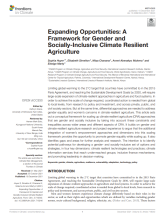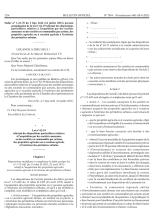Land Library
Welcome to the Land Portal Library. Explore our vast collection of open-access resources (over 74,000) including reports, journal articles, research papers, peer-reviewed publications, legal documents, videos and much more.
/ library resources
Showing items 4690 through 4698 of 74235.In its Phase 1 (September to December 2022) the Climate, Security and Food Systems theme workstream of the HDP coalition worked together with its members to collate state-of-the-art evidence on the connection between climate, food, and peace and security.
Conversion of native lands into agricultural use, coupled with poor land management practices, generally leads to changes in soil properties.
This resource accompanies Phase 1, Task 1, Step 1 of the Model Guidebook for Business Enterprises.
The preservation of suburban agricultural land in the face of rapid urbanization in the West African region has been a major problem in recent decades. This paper examines the land tenure strategies used by farmers in relation to their assessments of the impact of urban growth.
This practitioner’s guide explains how to promote gender-responsive forest tenure reform in community-based forest regimes. It is aimed at those taking up this challenge in developing countries.
Limiting global warming to the 2°C target that countries have committed to in the 2015 Paris Agreement, and reaching the Sustainable Development Goals by 2030, will require large-scale expansion of climate-resilient approaches in agriculture and food systems.
Land and ecosystems lay the foundation of the economy and the wellbeing of society. 85 percent of the world’s 1.2 billion young people live in regions that are directly dependent on land and natural resources for sustenance.
Est promulguée et sera publiée au Bulletin officiel, à la suite du présent dahir, la loi n° 62-19 édictant des dispositions particulières relatives à l’acquisition par des sociétés anonymes ou des sociétés en commandite par actions, des propriétés agricoles ou à vocation agricole à l’extérieur de
Land use planning is rarely a neutral process. Stakeholders often use it to control access to, ownership







